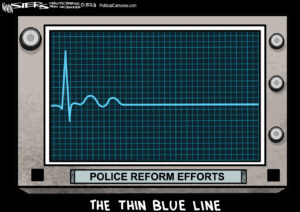‘Probably’ Isn’t Good Enough
The Troy Davis case makes a compelling case against the death penalty -- but not because it is exceptional. On the contrary, it's fairly ordinary.
The death penalty is a barbaric anachronism, a crude instrument not of justice but of revenge. Most countries banished it long ago. This country should banish it now.
The state of Georgia was wrong to execute convicted murderer Troy Anthony Davis as protesters and journalists kept a ghoulish vigil Wednesday night — just as the state of Texas was wrong, hours earlier, to execute racist killer Lawrence Russell Brewer.
That’s hard for me to write, because if anyone deserved a syringe full of lethal poison it was Brewer. He was an avowed white supremacist who had been convicted, along with two accomplices, of the 1998 hate-crime murder of a black man, James Byrd Jr. They offered Byrd a ride, beat him up and then killed him by chaining his ankles to the back of their pickup and dragging him for more than two miles. When police found Byrd’s body, it was dismembered and decapitated.
“I have no regrets,” Brewer said in an interview with Beaumont, Texas, television station KFDM earlier this year. “I’d do it all over again, to tell you the truth.”
Sweet guy, huh? Still, I can’t applaud his death at the hands of the well-practiced Texas executioners. It’s not that I believe his life had any redeeming value, just that the state was wrong to snuff it out.
The Davis case drew worldwide attention because of questions about the evidence of his guilt. Davis was found guilty of killing a Savannah, Ga., police officer, Mark MacPhail, in 1989. The conviction was based almost entirely on eyewitness testimony, and in the two decades since that trial, seven of nine witnesses have at least partially recanted.
The case became a cause celebre. Luminaries who could never be accused of being soft on crime — such as former FBI Director William Sessions and former GOP Rep. Bob Barr — argued that Davis should not be executed because of doubt about his guilt.
Wednesday night, in his last words, Davis told MacPhail’s family that “I did not personally kill your son, father and brother. I am innocent.” Then a deadly cocktail of drugs was pumped into his veins.
The Davis case makes a compelling case against the death penalty — but not because it is exceptional. On the contrary, it’s fairly ordinary.
Despite what you see on “CSI,” there isn’t always DNA or other physical evidence to prove guilt with 99.9 percent certainty. Jurors often have to rely on witnesses whose field of vision may have been limited — and whose recall, imperfect to begin with, degrades over time. Even when there’s no “reasonable doubt” about the defendant’s guilt — the standard for conviction — there’s often some measure of doubt.
And there are questions of process. Were witnesses coerced into testifying against Davis? A few say now that they were. Did prosecutors prove their case? The jurors certainly believed they did. Could racial bias have been a factor? Unlikely, given that the jury included seven blacks and five whites. Should Davis’ attorney have done a better job of presenting a defense? Almost surely.
It’s a mixed bag. I can’t ignore the fact that over the years, not one of the many judges who examined the case concluded there had been a true miscarriage of justice. This suggests to me that Davis was probably guilty.
But “probably” isn’t good enough in a capital case — and this is why the death penalty is flawed as a practical matter. Someone who is wrongly imprisoned can always be released, but death — to state the obvious — is irrevocable.
In scores of cases across the country, newly examined DNA evidence has proved that inmates jailed for rape or other sexual crimes were in fact not guilty. It is not just likely but certain that some defendants now on death row are innocent. Even if only one is eventually executed, that will be a tragic and unacceptable abuse of state power.
There was a chilling moment in a recent GOP candidates’ debate when Texas Gov. Rick Perry was asked about having authorized 234 executions, more than any other governor in modern U.S. history. The crowd, drawn largely from tea party ranks, cheered this record as if it were a great accomplishment. “I’ve never struggled with that at all,” Perry said, referring to execution as “the ultimate justice.”
But he should struggle with it. We all should.
Eugene Robinson’s e-mail address is eugenerobinson(at)washpost.com.
© 2011, Washington Post Writers Group
Your support matters…Independent journalism is under threat and overshadowed by heavily funded mainstream media.
You can help level the playing field. Become a member.
Your tax-deductible contribution keeps us digging beneath the headlines to give you thought-provoking, investigative reporting and analysis that unearths what's really happening- without compromise.
Give today to support our courageous, independent journalists.






You need to be a supporter to comment.
There are currently no responses to this article.
Be the first to respond.